Between Midnight and Dawn
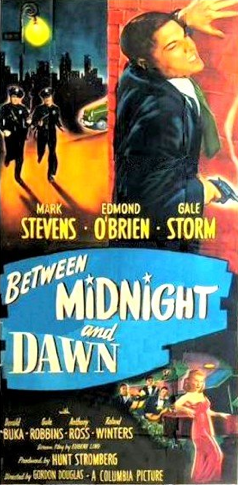
Introduction
Between Midnight and Dawn features one of the most vicious criminals in film noir, Ritchie Garris. Although he is a second tier character, he has outstanding significance, not because of what he does, but what he is to the film. Garris is the MacGuffin. He enables the film to convey several interesting ideas as well as to resolve the romantic problem among the three main characters. Without Garris, events wouldn’t occur and, therefore, the context wouldn’t exist for these ideas to be raised and for the right man and woman to become a couple.
Main Credits
Director: Gordon Douglas. Screenplay: Eugene Ling from story by Gerald Drayson Adams and Leo Katcher. Producer: Hunt Stromberg. Cinematographer: George Diskant. Music: George Duning. Art Director: George Brooks. Editor: Gene Havlick. Cast: Mark Stevens (Officer Rocky Barnes), Edmund O’Brien (Officer Dan Purvis), Gale Storm (Kate Mallory), Donald Buka (Ritchie Garris), Gale Robbins (Terry Romaine), Anthony Ross (Police Lt. Masterson), Roland Winters (Leo Cusick), Madge Blake (Mrs. Mallory), Philip Van Zandt (Joe Quist). Released: Columbia, October 1, 1950. 89 minutes.
Presentation
Within a few minutes, a great deal of information is presented that suggests what the film will be about. First, the Columbia Pictures logo appears, and brass instruments blare, heralding a crime film focused on law enforcers. Next, the names of the three stars are shown, and the music sweetens with strings. Their names are positioned as follows: Mark Stevens and Edmund O’Brien at the top corners, respectively, and Gale Storm centered below. This triangle represents their characters’ relationship. During the remainder of the credits, the film’s musical motifs alternate between brass ruggedness and string romanticism.
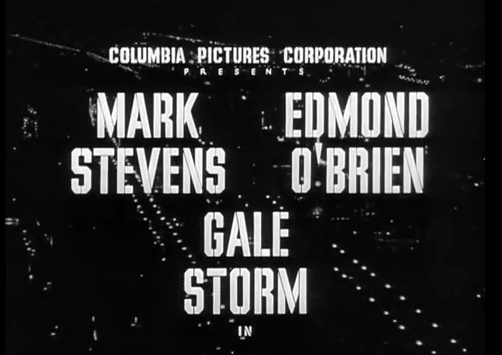
The film opens with an aerial view at night of an unnamed West Coast city. (The locations are in Los Angeles.) As often occurred at the start of law enforcement film noirs of that time, there is a male voice-over. However, instead of explaining the public value of some federal or state agency and how the following story is based on true events, the introduction is atypical.
“A big city is full of people and some people are full of crime. We know a lot about the big name experts: the mastermind detectives, the nationwide hard-hitting FBI. But before they reach the scene of the crime, there are generally some other guys who get there first. The men in prowl cars. The radio patrol. Their best weapons are a radio set and four wheels. Their battleground is every city street. Sometimes they win. Sometimes they lose. For their kind of enemy never rests or surrenders.”
The good guys in this film noir are different. They are the working class of law enforcement. The voice-over says that the forthcoming story takes place in an urban jungle, a noir world where there are no peaceful streets. Moreover, there is an acknowledgment that the bad guys may be undefeatable.
The introduction ends inside “the nerve center of headquarters, the Communications Division.” The way it works is shown in the documentary visual style of a police procedural. Telephone receptionists write down information on slips of paper when people call in needing help or seeing trouble. The papers are mechanically routed to the broadcasters’ room, where someone hands them out to dispatchers. Each dispatcher radios a pair of cops in their squad car, telling them where to go and what to do, such as “Speak to the woman. Keep the peace.” The broadcasters are women as well as men.
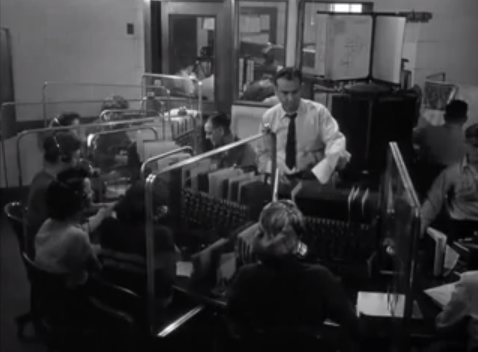
The beginning of the film is completed, and an important piece of the plot is provided, with the first exchange between Rocky and Dan in their patrol car. Rocky wants to “knock off and get a cup of coffee” because there is nothing interesting going on that night. Dan rebukes him, “How about covering the territory for a while?” Rocky replies, “Once, Daniel, I’d like to see you relax on duty.” Dan counters that he wants to make Rocky “into a policeman someday.” Immediately afterward they get a call to check out a possible robbery. Rocky admits that he spoke too soon.
The scene shows that Rocky has a much more casual commitment to his work than Dan. This contrast is made throughout the film. Rocky’s haste to “knock off” is significant in two ways. First, he isn’t the caliber of policeman necessary to meet the challenge of an enemy that “never rests or surrenders.” Second, despite initial appearances, he isn’t right for Kate, the third person in the triangle.
Rocky and Dan, with help from another pair of cops, thwart a garage heist. They arrest two teenage males (“a couple of sophomores”) for attempted robbery, along with their two 17-year old female accomplices. There are a couple of key points to this episode. First, as the introduction says, the radio patrols work in a war zone. Despite the young age of the culprits, they are armed and dangerous. The two would-be thieves fire their pistols repeatedly at Rocky and Dan before being captured. A police matron discovers a switchblade “tucked away inside the bun” in the hair of one of the girls.
The other girl is disconsolate about going to jail. This leads to the second point, which is to show Dan’s blanket hostility to everyone associated with the wrong side of the law, especially women.
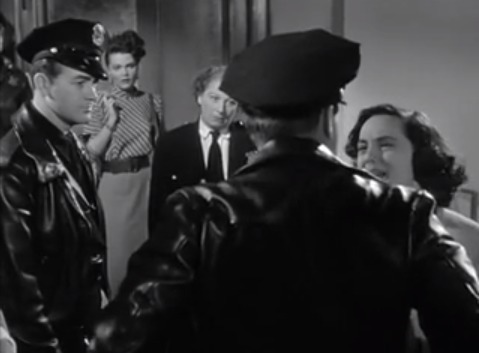
After Rocky and Dan drive away, Rocky has compassion for the second girl, “who was doing all the blubbering.” Dan sees no hope for her, “In another year she’ll be packing a shiv, ready to stick it into someone’s gut if she has to. Maybe your gut.”
Rocky says, “Still don’t get this Jekyll and Hyde twist. Purvis, the big-hearted nice guy civilian. Purvis, the tough cop. Mow ‘em down. Don’t give ‘em a second chance.” Dan answers, “Wait’ll you’ve had your fill of the scum. Slugging, knifing, shooting holes in decent people. You’ll toughen up, Junior.” Rocky persists, “They can’t be wrong all the way through. You oughta look inside. Maybe some of them rate a second chance.” Dan won’t budge, “I can read ‘em from the outside. I haven’t been wrong yet.”
Their dispute is interrupted by a woman’s voice over the car radio. It belongs to Kate, and she will later take sides against Dan’s refusal to see people in any way other than good or bad. In fact, the denouement of the film is Dan’s rejection of how he has judged people. Thus, the matter of the “blubbering” 17-year old girl is critical to the plot.
Rocky is smitten by the voice, and he wants to know who the woman is. Dan isn’t interested.
Like everyone else in the film, Dan calls Mark Stevens’ character, “Rocky,” except a few times when he says, “Junior.” However, Stevens almost always calls Edmund O’Brien’s character, “Pappy.” This suggests that Dan is older than Rocky, and perhaps too old to court a young woman like Kate. Although the film indicates that Rocky has been on the force for two years, there is no suggestion about how long Dan has served. Since they are both the same rank, and they served together as Marines in WWII, it is unlikely that Dan has much seniority over Rocky. Sometimes the film suggests that Rocky is younger than Dan. For example, he is more determined to woo Kate, and he can dance. Other times it shows them as similar in age, like a photo of them amusing themselves when they were Marines. In real life, O’Brien was born only nine months before Stevens, in December 1915.
Dan has a hunch that Ritchie Garris’ henchman, Joe Quist, threw a stink bomb through the front window of a mom-and-pop Italian restaurant. The owners hadn’t paid Garris for “protection.” Dan and Rocky go to Garris’ nightclub, the Starlight Club, to pick up Quist. When they arrive, Terry Romaine, the club’s thrush, is singing, “I want to learn about love from you.” This line suggests Terry’s romantic feelings for the man in her life, who is Garris.
When Rocky sees Terry, he holds Dan back so that they can watch and listen to her. Once again, Rocky wants to take a break from work. Dan is uninterested in Terry and makes Rocky move on to find Quist.
To keep Dan and Rocky from taking Quist to the station, Garris drops a $100 bill on the floor of his office. When they make fun of his bribe, Garris becomes furious and shouts at them to stay away. This starts a mutual hatred that intensifies for the rest of the film. At headquarters, Quist is quickly released because the owners of the restaurant are too frightened to identify him.
Dan and Rocky join other policemen in the station’s locker room. Referring to the blubbering 17-year old girl, one cop says that she “keeled over in a faint,” and he had to carry her into Juvenile Hall. He adds that, since she had no record and apparently “didn’t know the score” about the plans to rob the garage, she was going to be released. Rocky wants Dan to admit that he misjudged the girl, but Dan won’t do it.
Rocky bets everyone that the woman who has a voice with “velvet tones” is “a real pretty doll.” Only Dan takes the bet, because he is sure “she’s probably a dog,” and he wants to teach Rocky “a lesson.” He thinks the woman has “a nice voice and that’s probably as far as it goes.” During the war, as Dan has reminded him, Rocky was charmed by another female voice over the airwaves, which was Tokyo Rose’s. Rocky doesn’t think he could be wrong twice. Dan won’t allow that the voice might belong to “a doll,” but only to “a dog.” So far, Dan is a misogynist. But he is about to change.
As they walk down a hall, Rocky thinks he hears the voice. He leaves Dan in an outer office and enters the office of Lt. Masterson, where the voice is coming from. There he meets Kate, who is just leaving. Masterson delays Rocky a few moments and when Rocky returns to the outer office, he finds Dan and Kate close to each other. Dan is complimenting her that what she does is “a lot better than the old system.” (In other words, Dan and Kate have been talking about work. Unlike Rocky, it is something they enjoy discussing.)
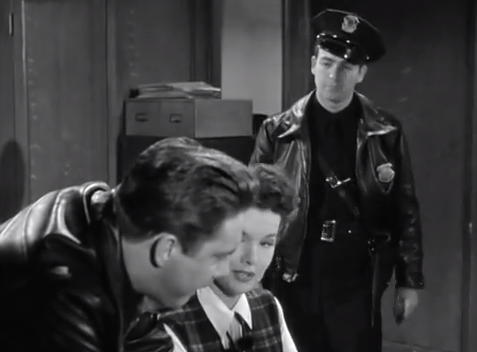
Rocky is jealous that Dan has already found out a lot about Kate’s background. Dan also wants to leave, but Rocky doesn’t. He seizes his chance and insists that Kate have a date with Dan and him. After much resistance, she agrees.
Rocky may have gotten Kate to go out, but Dan selects the destination, which is the Starlight Club. Although Rocky can’t see the reason for going there, Kate finds it very interesting. That is, she supports Dan’s choice. As they enter the club, Terry is finishing a song with the line, “Then don’t take your lips, your arms or your love away.” This foreshadows the end of her relationship with Garris.
Sitting at their table, Rocky’s back is to the camera, and Dan and Kate are framed together. Dan looks at her fondly. This, too, is a foreshadowing. She wants to learn about Garris, and Dan fills her in. Rocky interrupts, “Listen, Kate, not all policemen are like Pappy here. Some of us can relax and forget about business when we’re off duty.” She replies, with an Irish brogue, “Sure’n you’re wasting your breath telling a policeman’s daughter anything about policemen, Officer Barnes.” Dan catches on immediately, “Say, you’re not Lt. Mallory’s daughter, are you?” With Kate and Dan framed together, Rocky proposes a toast, “To a long and happy life together. The three of us.” Dan remarks, “That sounds a little crowded, doesn’t it?” In multiple ways, via camerawork and screenplay, the film is subtly pairing Kate with Dan, while overtly starting to couple her with Rocky.
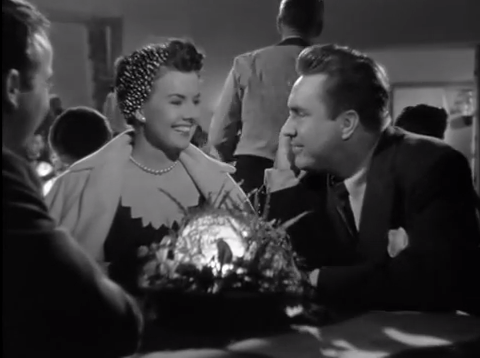
Dan spots Leo Cusick, “one of the big mobsters from the East.” Dan goes to call “the detective bureau. Give them a little hot tip.” Rocky and Kate get up to dance together, and their romance blossoms. Yet she hasn’t forgotten Dan, “For partners, you and Dan Purvis are complete opposites.” She asks Rocky, “Are you ever as serious about things as he is?” He replies, “Of course. At the proper moments. But this isn’t one of them.” Rocky is wrong. Cusick is at the nightclub to tell Garris that he wants to take over “the territory.” Dan does the right thing, and in a later scene Masterson praises getting this information because he anticipates, accurately, that Cusick and Garris are going to have “a slugfest.”
Back at their table, Rocky points out Terry to Kate, “Garris’ girlfriend. She’s not a bad looking doll.” Dan explodes, “All of a sudden your taste is in your feet not head. Any dame that would hook up with a character like Garris is a no-good filthy tramp.” Having thought that Dan was “so calm and easygoing,” Kate asks, “Well, did that come out of you?” Rocky explains, “Don’t let it worry you, Kate. He always starts spitting fire when he’s around people like these.” For the first time Kate sees that Dan has a Jekyll and Hyde personality.
When Rocky and Dan bring Kate home, they expect to take her out again the following night. She surprises them by saying that there won’t be a second date because she has a rule against going out “with a policeman more than once.”
As Kate undresses off-camera, she talks to her mother, who is shown in close-up lying in bed. It is a poignant scene. Mrs. Mallory is saddened by Kate’s refusal to go out again with Rocky and Dan, because she likes both men. She says Kate’s rule is “a foolish notion.” However, Lt. Mallory died in the line of duty. Kate is against dating cops to make sure she won’t marry one. She doesn’t want to repeat her mother’s life, always worried about her husband’s safe return after he leaves the house, or being left alone if he is killed. She says, “The man I marry is going to work in a nice, safe office.”
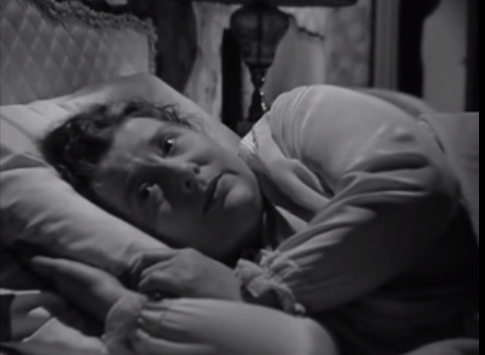
However, Mrs. Mallory doesn’t want Kate to miss an opportunity to change her mind. There is an apartment for rent in their house, and she lets it to Rocky and Dan – without telling Kate. When Kate sees Rocky and Dan at her front door with their belongings, she is shocked and annoyed. But her mother doesn’t flinch. She calls Kate’s objection to dating cops “cowardly…You don’t fall in love with men according to their occupation. You love with your heart not your head.”
Rocky and Dan make such a ruckus moving in that Kate goes next door to lay down the ground rules. Once again, Rocky is shown with his back to the camera, and Dan and Kate are framed together. The scene ends humorously, with Kate’s mother bringing the men a tray of coffee and sandwiches. She says, “I knew everything would work out all right.”
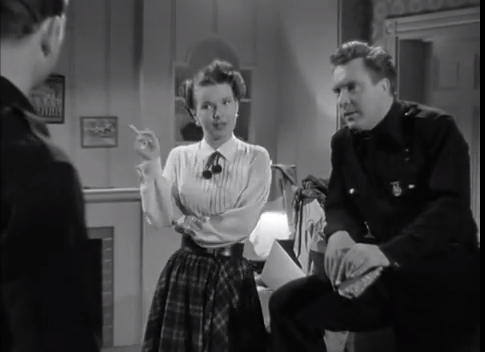
Mrs. Mallory also knows what is best for her daughter. Kate shouldn’t reject the men that she works with, men of her own background and social class. When Rocky fell for her voice, she was a temp broadcaster. Now she works for Masterson as a stenographer and file clerk. She likes her job, and she has changed her mind about dating cops. Furthermore, within the triangle, she isn’t the only one who has changed. Rocky says to Dan that, because he hasn’t missed one their dates with Kate, he “must have changed his mind about women.” Next, Dan will have to change how he judges women who “hook up” with bad guys, like the blubbering 17-year old girl. Or Terry Romaine.
As Garris and Terry are approaching the front door inside her apartment building, a little girl steps into the hallway and says, “Hi, Terry!” Terry turns around and says, “Oh, Kathy, sweetie.” She goes over to the girl, bends down, talks with her, and apologizes for forgetting to bring her some candy. Terry’s kindness toward the child, and the evidence from their conversation that she and Kathy are friends, means that Terry has to be understood not just as some hood’s moll, nor, as Dan called her, “a no-good filthy tramp.”
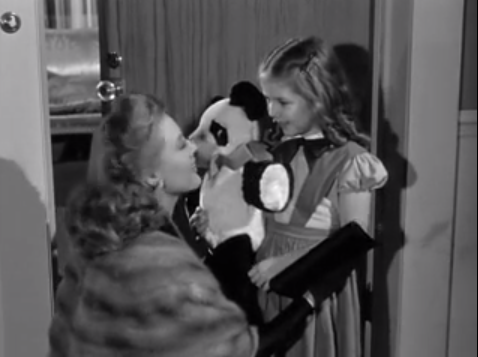
With Quist at the wheel, Garris sits in the backseat of his sedan, holding a rifle. Cusick leaves his office, walks toward his car, and Garris kills him. Quist and Garris speed off, but a man in a nearby building hears the gunshots and calls the police.
The pursuit of the sedan through the city by different patrol cars is loud, exciting cinema. No stringed instruments are played, only brass and percussion. Sirens wail and tires squeal. However, the most notable aspect of the sequence takes place at the broadcasters’ room, which is cut to repeatedly. In contrast to the darkness outside, the Communications Division is brightly lit. Kate stands silent, listening as one radio car after another is called into the chase. She is dreading to hear an alert for #13, Rocky and Dan’s car. After the announcement comes, and then each time there is a cut from the action to a close-up of her face, Kate’s distress is palpable, and there are violins on the soundtrack.
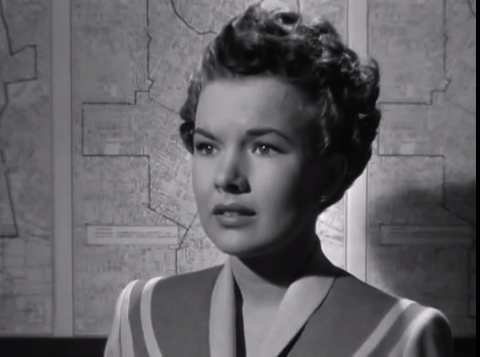
After gunfire is heard over the airwaves, the station loses radio contact with car 13. Kate fears the worst. Masterson tries to calm her with the speculation that the car radio might have been shot out. He says he is going to find out what happened, and he tells Kate to come with him, “Don’t just stick here and stew.”
Rocky shoots and kills Quist, causing the sedan to crash. Dan and Rocky pull Garris out of the car, and he is enraged to see them. After he can’t bribe them with $20,000 to frame Quist for Cusick’s murder, he vows revenge, “So help me I’ll get both you stinkin’ dirty flatfoots!”
As they drive, Masterson and Kate hear over the radio that another squad car has reported in for car 13 and requested an ambulance. Kate is alarmed that the ambulance is for car 13. Again, Masterson acts not only as Kate’s superior but also as her surrogate father. He says, “Hold onto yourself, Kate. Somebody in 13 told 12 to report in for them.” His use of the singular indefinite pronoun troubles her. She wonders aloud, “Somebody?”
When they arrive where the sedan crashed and Kate doesn’t immediately see Rocky, she nearly becomes hysterical. She rushes up to Dan, crying, “Where’s Rocky, Dan? What happened to him?” Rocky appears, and Kate tearfully embraces him. The romantic motif with violins, first heard in the credits, is played. They kiss. The camera cuts to Dan, who sees them and looks away. The music, which had ascended, now falls.
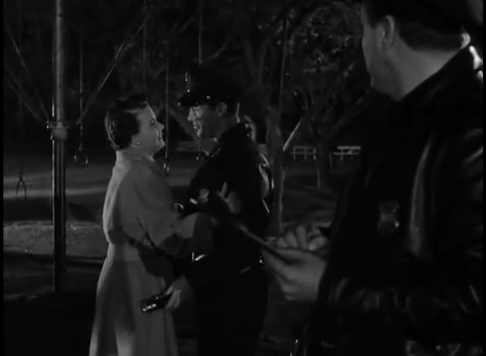
Garris has brought Kate and Rocky together romantically. The feelings they show for each other are different – much stronger – than only a short while ago, before Garris killed Cusick.
Rocky and Kate plan to marry after Garris’ trial. Now when Rocky takes Kate out, Dan stays in the apartment, claiming that he has other things to do. Rocky is puzzled by Dan’s behavior. But Dan knows the score, “Wake up, Rocky, at a time like this, three’s a crowd. Besides I’m busy anyway.” Dan makes excuses not to join them because he is hurt that Kate chose Rocky over him.
Garris is convicted of murder in the first degree. Before leaving the courtroom, he tells Terry to stay in town, and he repeats his threat to Rocky and Dan that he is going to “get” them. That night, as Garris is about to be transferred from a local jail to a state penitentiary, he has sharpshooters kill the sheriffs escorting him, and he escapes.
Masterson warns Rocky and Dan to be careful because “Garris might try and make good his threat.” The lieutenant is going serve as the father of the bride at Rocky and Kate’s wedding and he wants “nothing to happen to the groom before Saturday.” Rocky can’t see that Garris’ is a psychopath. He thinks Garris has only been “shooting off his mouth to make himself feel better.” But Masterson correctly understands Garris, and he is concerned that Garris “has some wild scheme in that cracked brain of his.”
In their radio car, Rocky tells Dan that, because Masterson is “giving Kate away, that practically makes him my father-in-law. I oughta be in solid.” Rocky never changes. From start to finish, he is a fine fellow but an immature policeman.
Moments later, Garris pulls up in a car along side of Rocky and fires several shots into him at point blank range. The scene of the car window being smashed by bullets that hit Rocky in the side of his head and neck is uncommonly violent. This is a rare kind of noir visual style: viscerally painful to see.
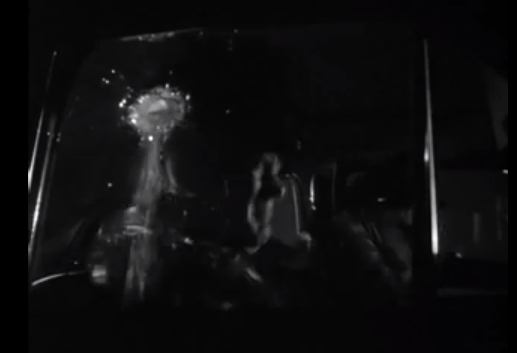
Kate gets to the hospital in time to be with Rocky before he dies. She walks past Dan, breaks down, then turns back and falls into his arms. He holds her tight and looks straight ahead.
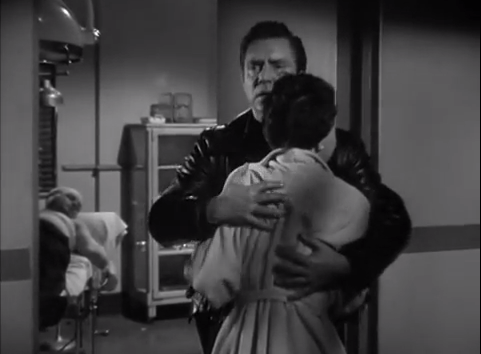
Garris has eliminated Dan’s rival.
Until Garris becomes a cop killer and the target of a statewide manhunt, Terry has stood by him. In her last song in the film, she sings, “There’s no otherwise. Don’t want your arms. Don’t want your lips. Your heart isn’t mine anymore….”
Although headquarters thinks that Terry is “on the level about being through with Garris,” Dan disagrees. Off-duty, he and Kate have been going to the Starlight Club, hoping that Terry will lead them to Garris. Kate wants to give up. “Dan, this won’t work. Sitting here night after night trying to play on her nerves. If she had anything to tell, she’d have cracked by now.” Dan, as always, is stubborn. “Those rock-hearted dames don’t crack easy, but she’ll crack. Believe me, she’ll crack.”
After Terry goes to her dressing room, Dan decides he will make her crack himself. He follows her, grabs her by the arms and says, “You’re gonna tell me where he is or so help me I’ll tear your head off!” Terry moves away from him, “You’re crazy. I don’t care if he’s caught. I don’t care if they even kill him now.” Dan calls her a liar and, as he shouts, “Where is he, where is he,” he strikes Terry’s face again and again. Appalled at what she has seen, Kate stops him, and Terry runs off crying.
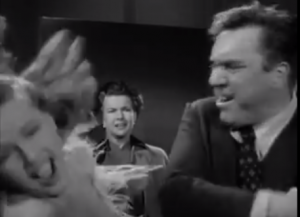
Dan, out of uniform and out of control, has acted as a vigilante.
The set up for the film’s climax and conclusion starts with Kate sitting in silence in Dan’s car as they ride through a rainy night. Finally, she speaks up, “I was afraid of this, but I hoped I’d never see it happen.” Dan says, “My slapping a woman? All right, I lost my head. But I don’t class tramps like her as women.” She answers, “It’s what’s happening to you that I’m talking about.” He’s unmoved, unapologetic, “I know what I’m doing, Kate. The only thing these hoodlums understand is an iron fist.”
Kate laments not having joined the police force earlier so that she could have met Rocky sooner and “at least had a couple of years together. I made a mistake then, Dan. You’re making one now.” He asks, “How? By trying to get Rocky’s killer?” She replies, “No. By letting bitterness over Rocky’s death make a brute out of you. A brutal policeman is a terrible thing. He has too much power. Too many chances of taking his viciousness out on helpless people.”
Dan responds in the only way he ever has, without admitting error. “Well, that’s a great speech. Why don’t you pin a medal on Garris for killing the man you were going to marry?” Stunned, she murmurs, “That was a terrible thing to say, Dan.” For the first time in the film, Dan acknowledges that he has been wrong. “I’m sorry. I must be crazy for talking to you like that, Kate. Forget I ever said that, will you?”
Dan is softening, humanizing. There is one more change that remains for him to make.
From a wiretap, police in the basement of Terry’s building are aware when Garris comes to her apartment. They alert headquarters. Garris wants to take Terry with him to Mexico. She isn’t interested, “It’s all over. I don’t want any more to do with you.” Garris can’t understand, “We always played it for keeps, didn’t we?” Terry answers, “That’s before you started spilling blood all over the streets.” She was fine with the protection (“grab-bag”) rackets, but she can’t stand having blood on her because “blood don’t wash off.” Garris raises his hand to show that he is willing to hit her unless she agrees to go with him.
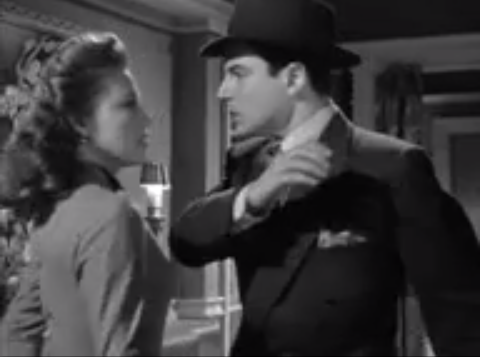
Kathy knocks on Terry’s door, and Garris realizes that the little girl might be useful to help them get away. Meanwhile, squad cars arrive, one of which has Masterson and Kate. Garris hears noises in the building and gets suspicious. He looks out a window and searchlights turn on. He reaches for Kathy, and Terry tries to prevent him from picking her up. Garris slugs Terry in the face twice, knocking her out. Then he hangs the screaming child out the window.
Dan proposes to climb out another window on the same floor and make his way along a ledge to get to Terry’s apartment. Kathy’s parents agree to the plan, and Masterson tells Garris that if puts the girl back inside, he will call off his men and shut off the searchlights.
After Garris revives Terry, they leave Kathy in the living room and go to get Terry’s coat. Dan edges closer on the outside of the building. When he reaches Terry’s apartment, he throws a “gas bomb” through the window. Once Dan jumps into the living room, he and Garris start firing their guns. Gas fills up the space between them, making it almost impossible for them to see one another.
As Dan starts moving forward, he coughs on the gas. Garris hears him and takes aim. Just as he fires, Terry steps in front of him and shouts, “No, Ritchie, you’re not going to kill any more!” Two bloody gunshot wounds appear, one after another, on the waist of her dress.
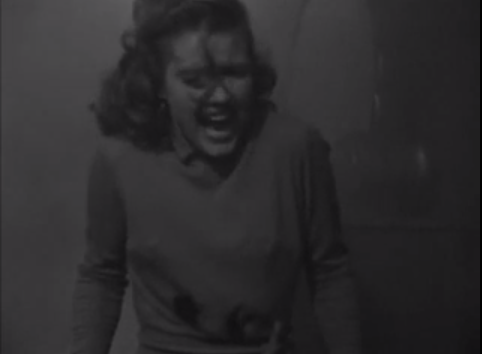
Garris runs into the hallway, with Dan in pursuit. Garris tries to get to a stairway, and Dan unloads his pistol. Garris’ left hand leaves a streak of blood on a wall before he falls down the stairs.
From the moment Kathy enters Terry’s apartment until she’s rescued, Between Midnight and Dawn presents one of the most impressive climaxes in all of film noir.
Dan re-enters the apartment and gently lifts up Terry. Seeing that it is too late, he lays her back down. He appears to reflect on what happened, what she did. Terry is the film’s most complicated character, registering her feelings about Garris in snippets of songs barely heard in the background of the soundtrack, giving almost maternal affection to the little girl, Kathy, and atoning for hooking up with Garris by saving Dan’s life.
For a time in the film, just as Dan and Garris can’t recognize each other in the gas, their personalities become indistinguishable. Not only is this because of their mutual loathing, it is also their willingness to punish Terry for resisting them by beating up her face.
Dan avenges Rocky’s murder in uniform and in the line of duty. He has learned from Kate’s criticism of him and Terry’s sacrifice for him that he was wrong to go outside official procedure and behave as a vigilante. He has changed into being a better cop, and he is about to show that he has also changed into being a better man.
Kathy’s mother thanks Dan and says to Kate, “Take good care of him, Miss.” “I will,” Kate assures her.
A reporter asks Dan, “Is it really on the level that the Romaine dame got knocked off saving you?” Dan replies, “Yeah, that’s on the level.” The reporter says, “But that don’t make sense, a dame like that saving a cop.” Dan responds, with Kate standing next to him and smiling, “Well, maybe if she’d never met a guy like Garris, she wouldn’t have become a dame like that.”
Kate says to Dan, “You know, you’re beginning to sound like Rocky.” He asks, “Well, is that bad?” Taking his arm, she answers, “No, Officer Purvis, it certainly isn’t.” He looks down at her hand on his arm. She smiles. Violins again play the romantic motif that was heard during the credits and when Rocky and Kate kissed. The camera lifts up and above Dan and Kate as they walk forward on a street, and the film ends.
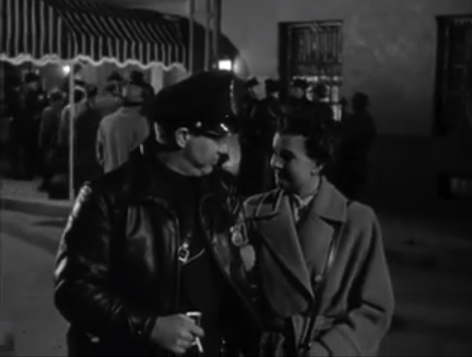
Garris is responsible for the situation in which Terry gives up her life to save Dan’s. Her sacrifice creates the opportunity for Dan to change his mind about judging women as “no-good filthy tramps” when they hook up with bad guys. In Rocky’s words, Dan is willing to “look inside” these women because “maybe some of them rate a second chance.”
Previously, as Rocky pointed out, Dan had changed his mind about women in general, which led to his falling in love with Kate. Dan’s new way of thinking makes it possible for Kate to fall in love with him, because he has become like Rocky. That is, Dan has shed the intolerant, stubborn, brutish aspects of his character, the ones that repelled Kate. His personality is more wholesome because it is more whole, no longer split into what Rocky called a “Jekyll and Hyde twist.”
Compared to Rocky, Dan is a superior match for Kate. Their dedication to work is essential to their mutual attraction. The camera has framed them together from the first time they met. But it is what Garris does in the film that enables Dan and Kate to be romantically coupled.
Does the prominence of romance in Between Midnight and Dawn weaken it as a film noir? No, because the experience of love is central to what makes it a film noir. Love in the film is intimately associated with death. Kate is initially afraid to marry a policeman because he is more likely to die young than an office worker. Her mother shows commendable strength as a survivor. She sets a high standard for Kate and Dan to meet.
Surviving the death of a spouse, a parent, a child, a close relative, or a friend was heartbreaking and life changing for many Americans who lived through World War II. Between Midnight and Dawn was released several months after the United States went to war again, in the Korean peninsula. There would have been a connection between an audience and the plot of the film, not because the characters were cops, but because the police were displaced soldiers, fighting, as the introduction says, “in a battlefield.”
The theme about the challenge of living for those who survive the death of a loved one is very relevant to the time of the film’s release. After the death of a spouse or lover, the survivor could become close-minded about dating (like Kate is toward cops) or instead be open to any romantic opportunity. As Kate’s mother says, “You love with your heart not your head.” Given how stressful it can be for a survivor to try to find romance again, Mrs. Mallory’s words are not a platitude.
After Rocky is murdered, Kate and Dan have to go on living. The film may have a romantic finale, but there isn’t an unqualified happy ending. Kate and Dan are two survivors who have suffered emotional devastation from Rocky’s death. The introduction says that sometimes cops win, and sometimes they lose. The film shows that this has two meanings. Cops sometimes get the bad guys, and sometimes they don’t. Also, sometimes cops come home, and sometimes they don’t.
Just as the film’s musical motifs alternate between brass (the noir world in the streets) and strings (the romantic world at home), people go back and forth from where it is dangerous to where it is safe. Between Midnight and Dawn doesn’t pull punches with its characters. Some don’t make it, and others have to bear with it. That is noir all the way.
Little in detail has been written about Between Midnight and Dawn. Three authors of film noir reference books praise it, but each of them notes that is it unsung.
Michael L. Stephens: “Unjustly overlooked, Between Midnight and Dawn is one of the strongest “B” films noirs. (Film Noir: A Comprehensive, Illustrated Reference to Movies, Terms and Persons, McFarland & Company, Inc., 1995, p. 34)
Michael F. Keaney: “Unfairly underrated, this exciting noir….” (Film Noir Guide: 745 Films of the Classic Era, 1940-1959, McFarland & Company, Inc., 2003, p. 35)
John Grant: “With a screenplay full of hardboiled one-liners, assured direction, and outstanding performances from the two principals, it’s surprising this noir is so often overlooked.” (A Comprehensive Encyclopedia of Film Noir: The Essential Reference Guide, Limelight Editions, 2013, p. 60)
In popular and scholarly publications, Between Midnight and Dawn isn’t considered worthy of inclusion in film noir’s canon. But it should be. As I have tried to show, Eugene Ling’s screenplay is as intelligent as it is tight. I have also tried to indicate that George Duning’s score is integral to the expression of the film’s themes. I have only hinted at the excellence of the cinematography by George Diskant. Finally, I have the highest esteem for the craftsmanship by the director, Gordon Douglas.
I hope that one day Between Midnight and Dawn will be widely recognized as a great film noir.